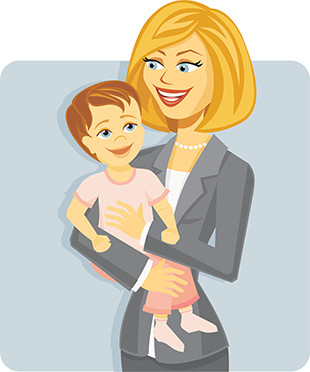
On the occasion of International Working Women’s Day we presented the provisions in labor legislation related to “Equality Principle” and “Protective Provisions” in our first article. Further we want to specify some arrangements for working mothers included in Labor Law, and Regulations.
WORK DURING MATERNITY NURSING LEAVE
– Women cannot be employed in work for eight weeks prior and eight weeks after the childbirth. In cases of multiple pregnancies, two weeks are added to the eight-week period prior to the birth. If the expectant mother stops working three weeks before the delivery, and obtains doctor’s approval, the leave period she worked will be added to her leave period after the birth.
– Female employee may also take an unpaid leave of up to six months after the expiry of the sixteen weeks, or in the case multiple pregnancies, after the expiry of the eighteen weeks.
– The female employee shall be granted paid leave for periodic examinations during her pregnancy.
Depend on the medical report; the pregnant women may be assigned to lighter duties without any reduction in her wage.
NURSING LEAVE AND PAY
– Mothers may request breaks during the working day amounting to 1 hour 30 minutes per day for breastfeeding, – Mothers schedule the periods for breastfeeding, i.e. at what times and in how many parts she will use this break and notify the employer in writing, and a “written approval” should be received from employer as an evidencing document.
– This leave stars after the mother comes back to work after her statutory maternity leave period (or/and 6 months optional unpaid leave, if any) applies until the baby is one year old,
– Working is prohibited for nursing women at night within the 6 months following delivery, and they cannot be forced to work exceeding 7,5 hours a day.
– Nursing mother or uninsured breastfeeding spouse of a male insurance holder are entitled to Nursing Allowance which is a lump sum payment for per baby, on condition that the minimum 120 days short term insurance branches premium have been notified within one year prior to birth.
FLEXIBLE WORKING HOURS FOR MOTHERS
– Half Time Working Pay after Childbirth
- After the maternity leave, working women may work half time up to sixty days on first childbirth, one hundred and twenty days on second and one hundred and sixty days for the third child, “and non-worked hours will be compensated by the state.
- Insurance premiums and wages corresponding to hours worked will be paid by employer, and insurance premiums and wages for off-hours will be covered by the state through Unemployment Insurance Fund, on condition that minimum 600 days unemployment insurance premiums should be notified for employee within the last three years prior to childbirth.
- The State subsidy is equal to daily gross minimum wage and it is not subject to any tax or deduction, except stamp tax.
– Half Time Work Until the Child Begins the School
- Mother or any of the parents may choose to work part time until the first day of the month following the date child’s compulsory schooling begins.
If one of the parents is not working, this provision cannot be applied. - The claim should be made by notifying the employer in writing at least one month before, and this claim cannot constitute a just cause for the employer for terminating the employment contract.
- Parents may switch to fulltime working by notifying the employer in writing at least one month before, on condition that not benefiting from this right again for the same child.
REGULATION ON WORKING CONDITIONS OF PREGNANT OR NURSING WOMAN, NURSING ROOMS AND CHILD CARE UNITS
- Women cannot be forced to work in night shift after their pregnancy is determined by medical report.
- It is prohibited to employ mother in night sift during the one year following childbirth.
- Pregnant and nursing women cannot be engaged in work over 7,5 hours a day.
- In the workplaces employing between 100-150 women (regardless of their marital status or age), there must be a nursing room in which mothers may feed their babies, and this room must have the necessary privacy, i.e. separate from the workplace but not far away more than 250 meters, otherwise employer is obliged to provide the transport.
 Turkish Labor Law
Turkish Labor Law



